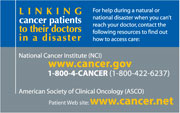|
The National Cancer Institute's (NCI) Cancer Information Service (CIS) and the American Society of Clinical Oncology (ASCO) have teamed up to help link patients and their health care providers in the event of a natural or national disaster. After the devastation caused to the Gulf Coast region by Hurricanes Katrina and Rita in 2005, many cancer patients in this region found themselves evacuated from their homes and without access to their physicians or medical records. NCI and ASCO worked together to help connect displaced cancer patients to resources for continuing treatment. Following the 2005 hurricane season, NCI and ASCO continued their collaboration to develop a Disaster Response Wallet Card. This card is designed to serve as an aid to displaced patients seeking continued cancer treatment and will be piloted during the 2008 hurricane season which runs from June through November.
 |  |  | Disaster Response Wallet Card |
The wallet card directs patients to ASCO's Web site for patients (www.cancer.net), and the NCI's Cancer Information Service (1-800-4-CANCER national toll-free number, LiveHelp™ instant messaging, and e-mail services). The CIS will facilitate the sharing of information between doctors, health care personnel, and patients/families searching for each other or for cancer care.
Specifically, NCI's CIS will utilize their communications services to:
- Collect contact information from physicians and add it to the ASCO provider list.
- Work with ASCO to help connect patients with their health care teams.
- Operate as a mechanism to distribute important disaster-related messages.
- Assist callers who have limited phone/Internet availability to access resources on NCI's Web site, www.cancer.gov, and ASCO's Cancer.Net, www.cancer.net.
If cancer patients become displaced due to a hurricane, they may not have access to their medical records, or their records may have been destroyed, making it difficult to determine their diagnosis, medical history, and best course of treatment. The wallet card provides space to write the patient's name, diagnosis, and treatment.
Patients and health care providers can order cards. Due to limited quantities of the Disaster Response Wallet Card, the pilot program is currently available only to individuals and oncology practices in the Gulf Coast states and Atlantic coastal states at risk for serious hurricanes. An evaluation of the pilot will help determine whether the program is expanded to cover other geographic areas or other potential disasters. Oncology practices and patients living in hurricane risk states can call CIS at 1-800-4-CANCER to order the wallet cards, or place orders through NCI's Publications Ordering Service. Quantities may be limited.
View or print the wallet card (PDF format). |